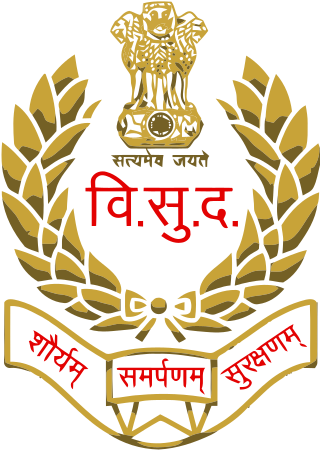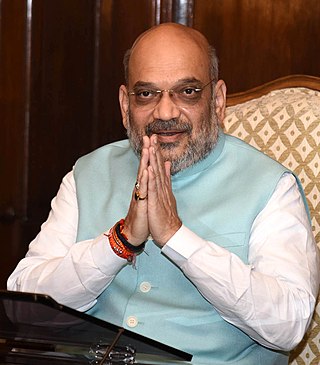
The prime minister of India is the head of government of the Republic of India. Executive authority is vested in the prime minister and their chosen Council of Ministers, despite the president of India being the nominal head of the executive. The prime minister is often the leader of the party or the coalition with a majority in the lower house of the Parliament of India, the Lok Sabha, which is the main legislative body in the Republic of India. The prime minister and their cabinet are at all times responsible to the Lok Sabha.

The Rajya Sabha, constitutionally the Council of States, is the upper house of the bicameral Parliament of India. As of 2023, it has a maximum membership of 250, of which 238 are elected by the legislatures of the states and union territories using single transferable votes through open ballots, while the president can appoint 12 members for their contributions to art, literature, science, and social services. The potential seating capacity of the Rajya Sabha is 250, according to article 80 of the Indian Constitution. Members sit for staggered terms lasting six years, with about a third of the 238 designates up for election every two years, in even-numbered years. Unlike the Lok Sabha, the Rajya Sabha is a continuing chamber and hence not subject to dissolution. However, the Rajya Sabha, like the Lok Sabha, can be prorogued by the president.

The Lok Sabha, constitutionally the House of the People, is the lower house of India's bicameral Parliament, with the upper house being the Rajya Sabha. Members of the Lok Sabha are elected by an adult universal suffrage and a first-past-the-post system to represent their respective constituencies, and they hold their seats for five years or until the body is dissolved by the President on the advice of the council of ministers. The house meets in the Lok Sabha Chambers of the Sansad Bhavan, New Delhi.

The Parliament of India is the supreme legislative body of the Republic of India. It is a bicameral legislature composed of the president of India and two houses: the Rajya Sabha and the Lok Sabha. The president in their role as head of the legislature has full powers to summon and prorogue either house of Parliament or to dissolve the Lok Sabha. The president can exercise these powers only upon the advice of the prime minister and their Union Council of Ministers.

The Special Protection Group (SPG) is an agency of the Government of India whose sole responsibility is protecting the Prime Minister of India and in some cases, his or her family. It was formed in 1988 by an Act of the Parliament of India. The SPG protects the Prime Minister at all times both in India and abroad, as well as the Prime Minister's immediate family members residing with them at their official residence. Family members, however, may decline security.

The 42nd amendment, officially known as The Constitution Act, 1976, was enacted during the Emergency by the Indian National Congress government headed by Indira Gandhi.

Rashtriya Raksha University (RRU), formerly Raksha Shakti University (RSU), is a central university and an Institute of National Importance located in Gandhinagar, Gujarat, India. It has a specialization in national and internal security. It is not to be confused with the Indian Defence University (IDU) which is focused on the Indian military, whereas RRU is focused on the police and para-military Central Armed Police Forces (CAPF).

Amit Anil Chandra Shah is an Indian politician who is currently serving as the 31st Minister of Home Affairs since 2019 and the 1st Minister of Co-operation of India since 2021. He served as the 10th President of the Bharatiya Janata Party (BJP) from 2014 to 2020. He has also served as chairman of the National Democratic Alliance (NDA) since 2014. He was elected to the lower house of Parliament, Lok Sabha, in the 2019 Indian general elections from Gandhinagar. Earlier, he had been elected as a member of the upper house of Parliament, Rajya Sabha, from Gujarat from 2017 to 2019.
Whistle Blowers Protection Act, 2011 is an Act of the Parliament of India which provides a mechanism to investigate alleged corruption and misuse of power by public servants and also protect anyone who exposes alleged wrongdoing in government bodies, projects and offices. The wrongdoing might be in the form of fraud, corruption or mismanagement. The Act will also ensure punishment for false or frivolous complaints.

The Lokpal and Lokayuktas Act, 2013, commonly known as The Lokpal Act, is an anti-corruption Act of Indian Parliament in India which "seeks to provide for the establishment of the institution of Lokpal to inquire into allegations of corruption against certain important public functionaries including the Prime Minister, cabinet ministers, members of parliament, Group A officials of the Central Government and for matters connecting them".

The Representation of the People Act, 1951 is an act of Parliament of India to provide for the conduct of election of the Houses of Parliament and to the House or Houses of the Legislature of each State, the qualifications and disqualifications for membership of those Houses, the corrupt practices and other offences at or in connection with such elections and the decision of doubts and disputes arising out of or in connection with such elections. It was introduced in Parliament by law minister Dr. B.R. Ambedkar. The Act was enacted by the provisional parliament under Article 327 of Indian Constitution, before the first general election.
The Andhra Pradesh Reorganisation Act of 2014, commonly known as the Telangana Act, is an Act of Indian Parliament that bifurcated the state of Andhra Pradesh into Telangana and the residuary Andhra Pradesh state, as an outcome of the Telangana movement. The Act defined the boundaries of the two states, determined how the assets and liabilities were to be divided, and laid out the status of Hyderabad as the permanent capital of new Telangana state and temporary capital of the Andhra Pradesh state.

Juvenile Justice Act, 2015 has been passed by Parliament of India amidst intense controversy, debate, and protest on many of its provisions by Child Rights fraternity. It replaced the Indian juvenile delinquency law, Juvenile Justice Act, 2000, and allows for juveniles in conflict with Law in the age group of 16–18, involved in Heinous Offences, to be tried as adults. The Act also sought to create a universally accessible adoption law for India, overtaking the Hindu Adoptions and Maintenance Act (1956) and the Guardians and Wards Act (1890), though not replacing them. The Act came into force from 15 January 2016.

The Enemy Property Act, 1968 is an Act of the Parliament of India, which enables and regulates the appropriation of property in India owned by Pakistani nationals. The act was passed following the Indo-Pakistani War of 1965. Ownership is passed to the Custodian of Enemy Property for India, a government department. There are also movable properties categorized as enemy properties.

The Muslim Women Act, 2019 is an Act of the Parliament of India criminalising triple talaq. In August 2017, the Supreme Court of India declared triple talaq, which enables Muslim men to instantly divorce their wives, to be unconstitutional. The minority opinion suggested the Parliament to consider appropriate legislation governing triple talaq in the Muslim community.
The Citizenship (Amendment) Act, 2019 (CAA) was passed by the Parliament of India on 11 December 2019. It amended the Citizenship Act, 1955 by providing an accelerated pathway to Indian citizenship for persecuted religious minorities from Afghanistan, Bangladesh and Pakistan who are Hindus, Sikhs, Buddhists, Jains, Parsis or Christians, and arrived in India before the end of December 2014. The law does not grant such eligibility to Muslims from these countries. The act was the first time that religion had been overtly used as a criterion for citizenship under Indian law, and it attracted global criticism.
The Transgender Persons Act, 2019 is an act of the Parliament of India with the objective to provide for protection of rights of transgender people, their welfare, and other related matters. The act was introduced in the Lok Sabha, the lower house of the Parliament, on 19 July 2019 by the Minister of Social Justice and Empowerment, Thawar Chand Gehlot, in light of the lapse of the Transgender Persons Bill, 2018. The 2019 act and the immediately preceding 2018 bill, were both preceded by a 2016 version. They were met with protests and criticism by some transgender people, lawyers, and activists in India. The 2016 bill was sent to a standing committee which submitted its report in July 2017. Following this, the Lok Sabha tabled and passed a newer version of the bill in December 2018. However, it did not incorporate many of the committee's recommendations. Although members of the opposition criticised the 2019 act and assured activists that they would not vote in favour of it, it was passed by the Lok Sabha on 5 August 2019 and by the Rajya Sabha, the upper house of the Parliament, on 26 November 2019. The president assented to it on 5 December 2019, upon which the act was published in the Gazette of India. It has been in effect since 10 January 2020 following a notification of the same in the Gazette on the same day.

The Forty-fourth Amendment of the Constitution of India, officially known as the Constitution Act, 1978, was enacted by the Janata Party which had won the 1977 general elections campaigning on a promise to "restore the Constitution to the condition it was in before the Emergency". The Amendment aimed to undo several changes that had been made to the Constitution by the 42nd Amendment which had been enacted by the Indira Gandhi-led Indian National Congress during the Emergency.
Defection by legislators occurs in many democracies. It can be argued that they can undermine the stability of the cabinet, which is dependent on the support of elected legislators. The argument follows that such instability can amount to a betrayal of the people's mandate, as voiced at the most recent prior election.
The Farmers' Produce Trade and Commerce Act, 2020 was an act of the Indian Government that permits intrastate and inter-state trade of farmers’ produce beyond the physical premises of Agricultural Produce Market Committee (APMC) market yards (mandis) and other markets notified under state APMC Acts.








